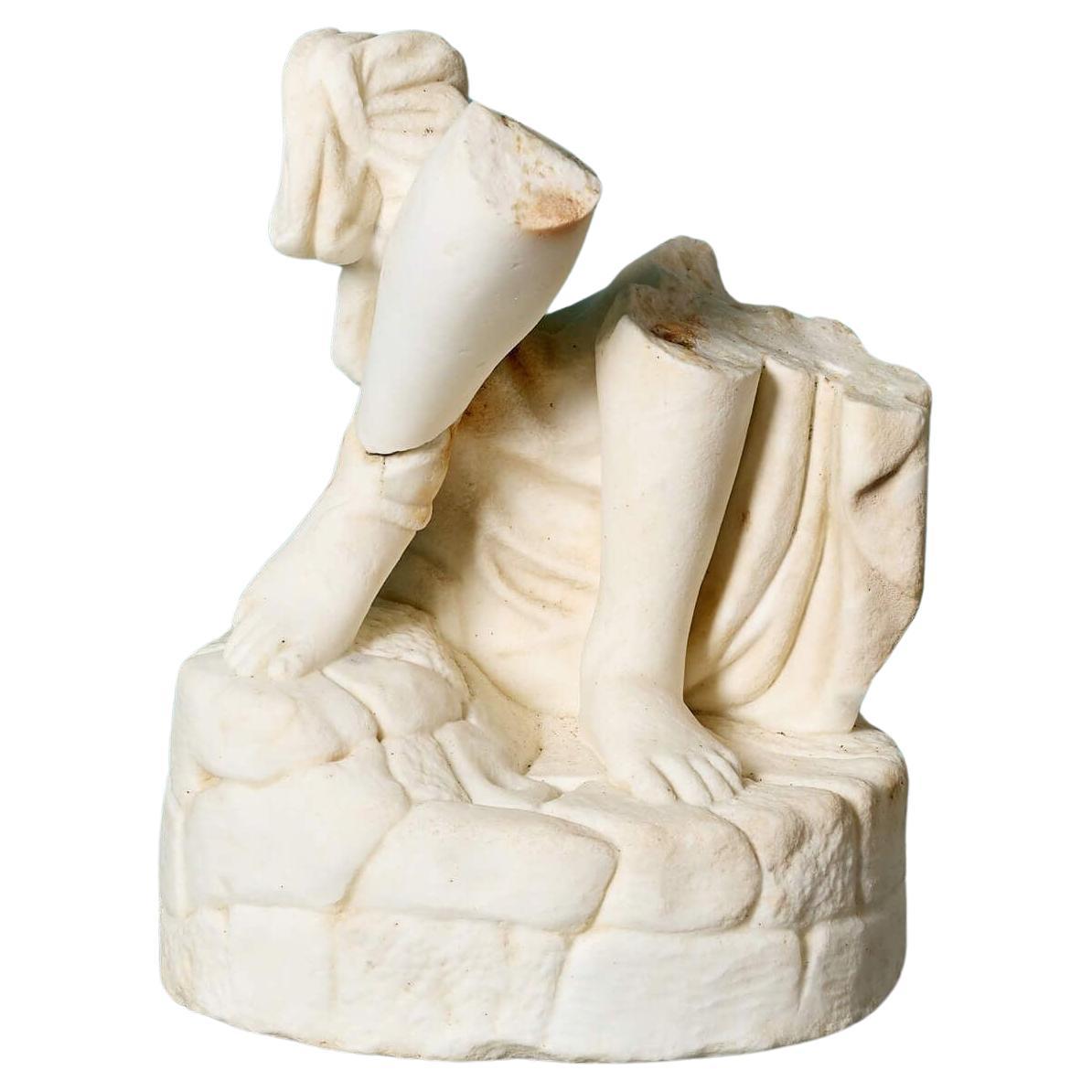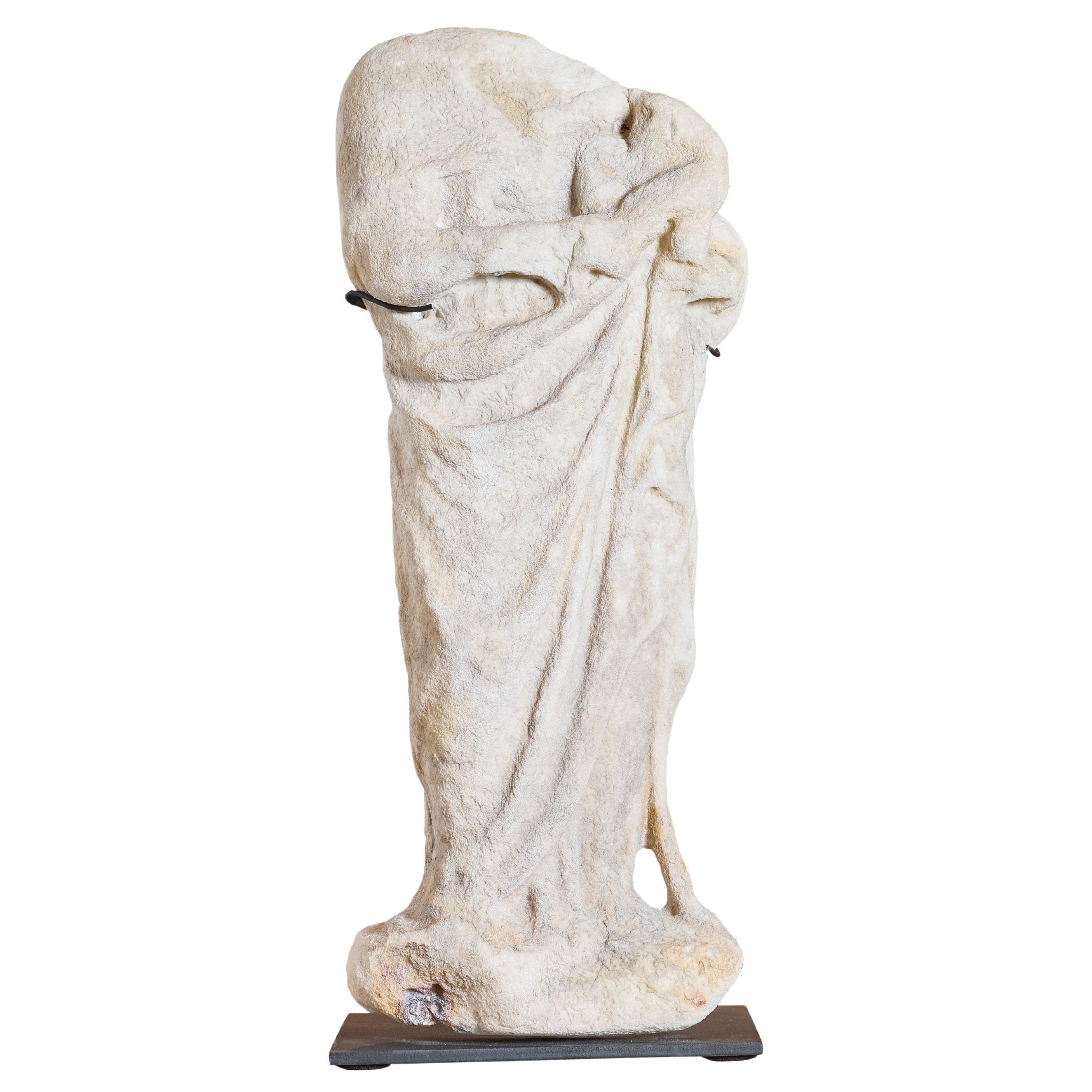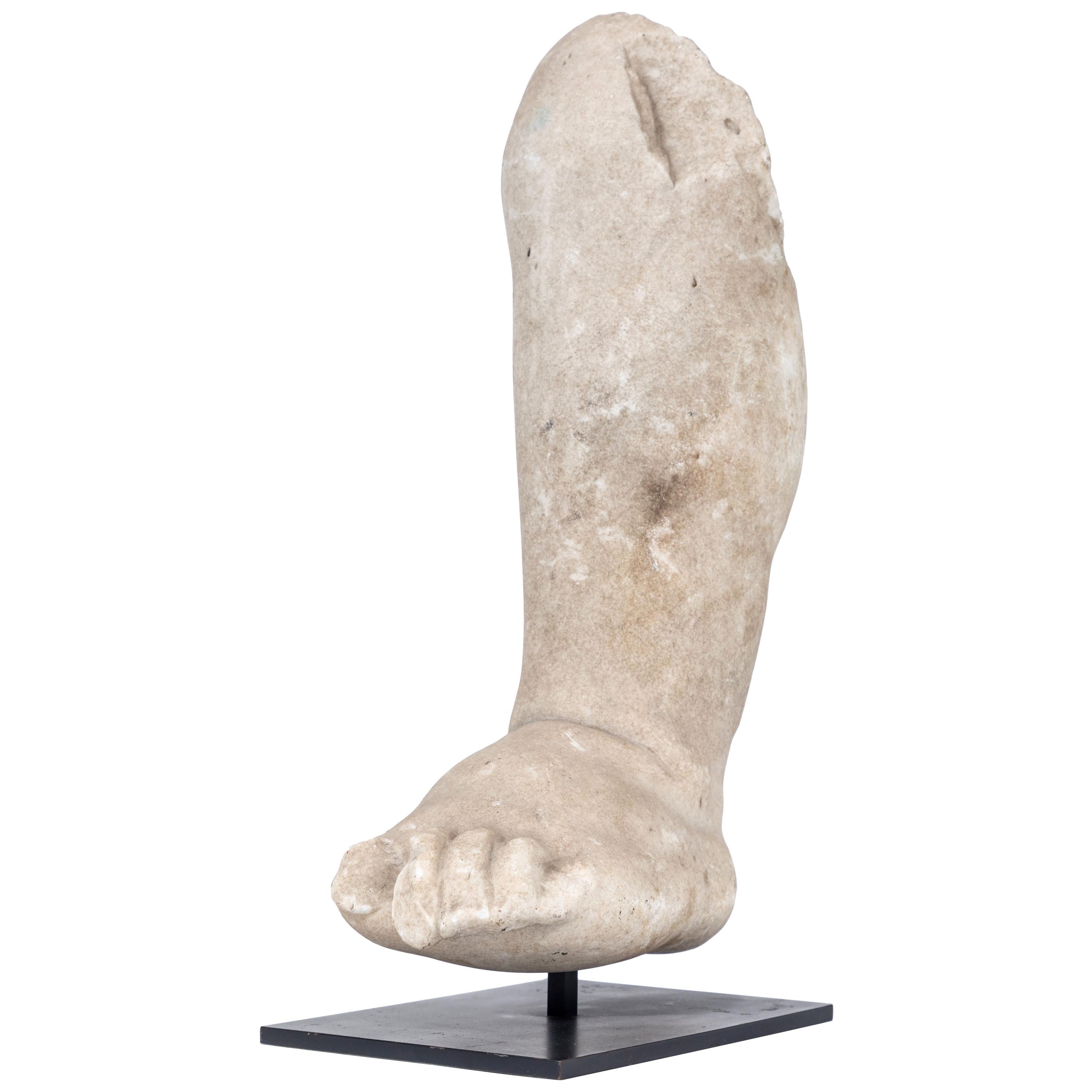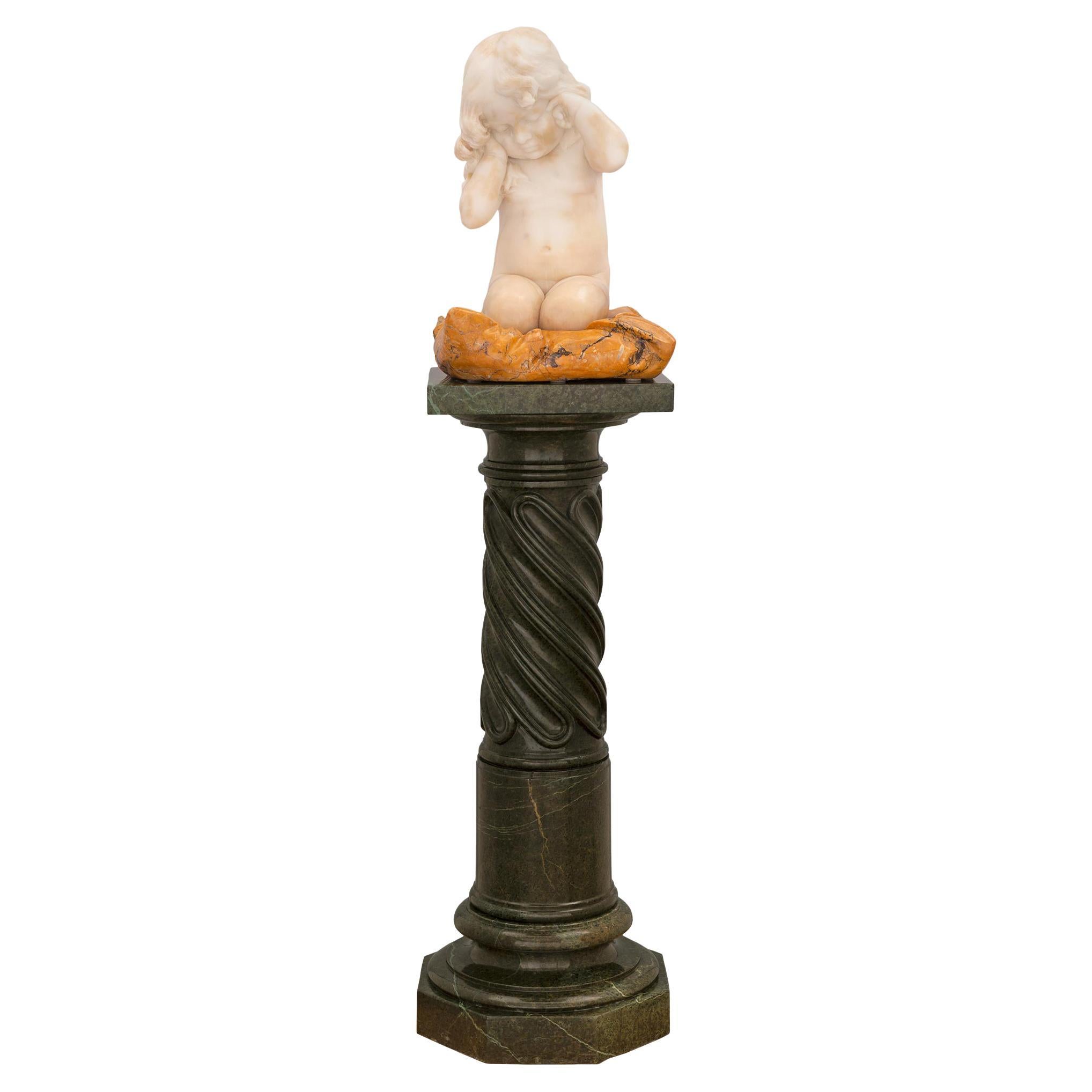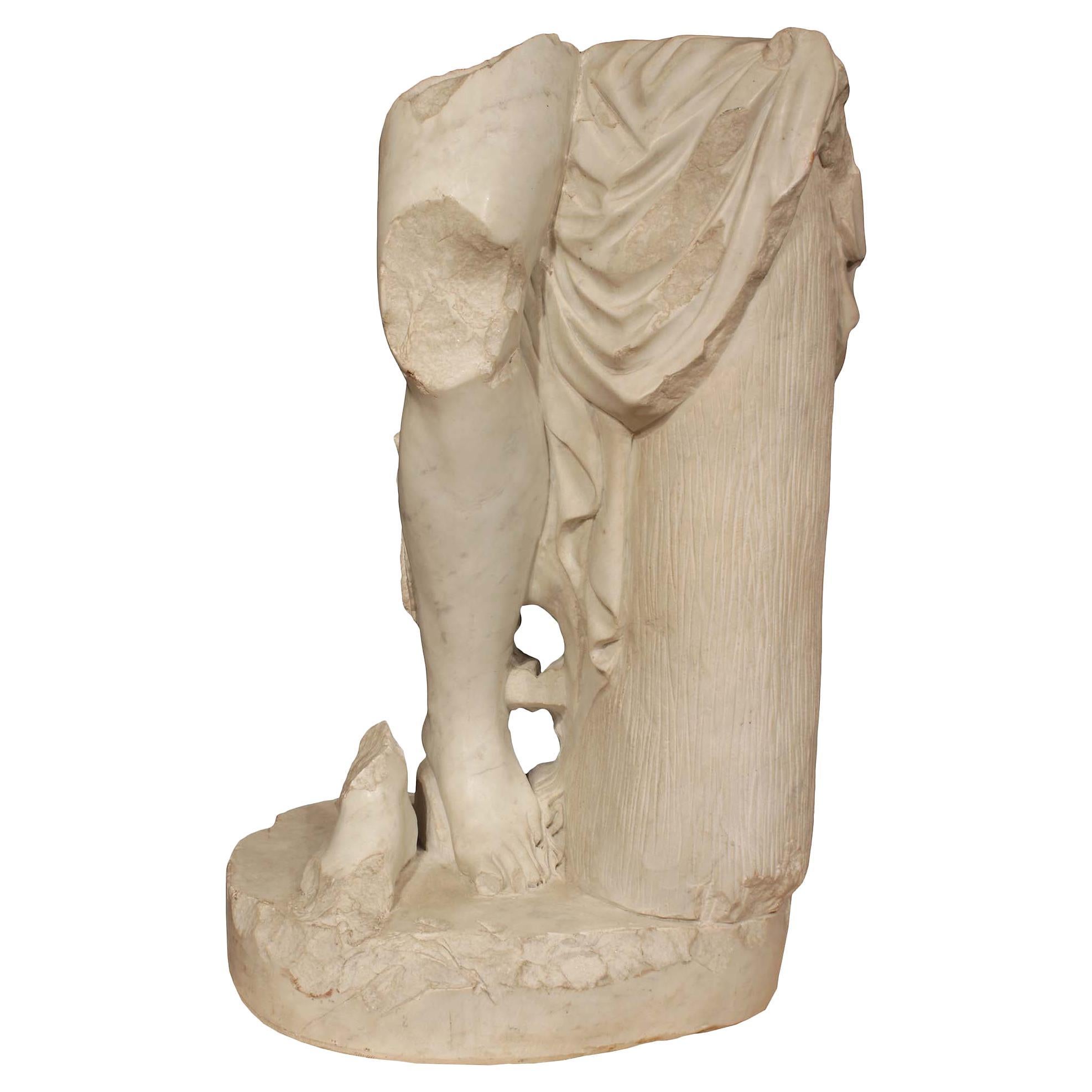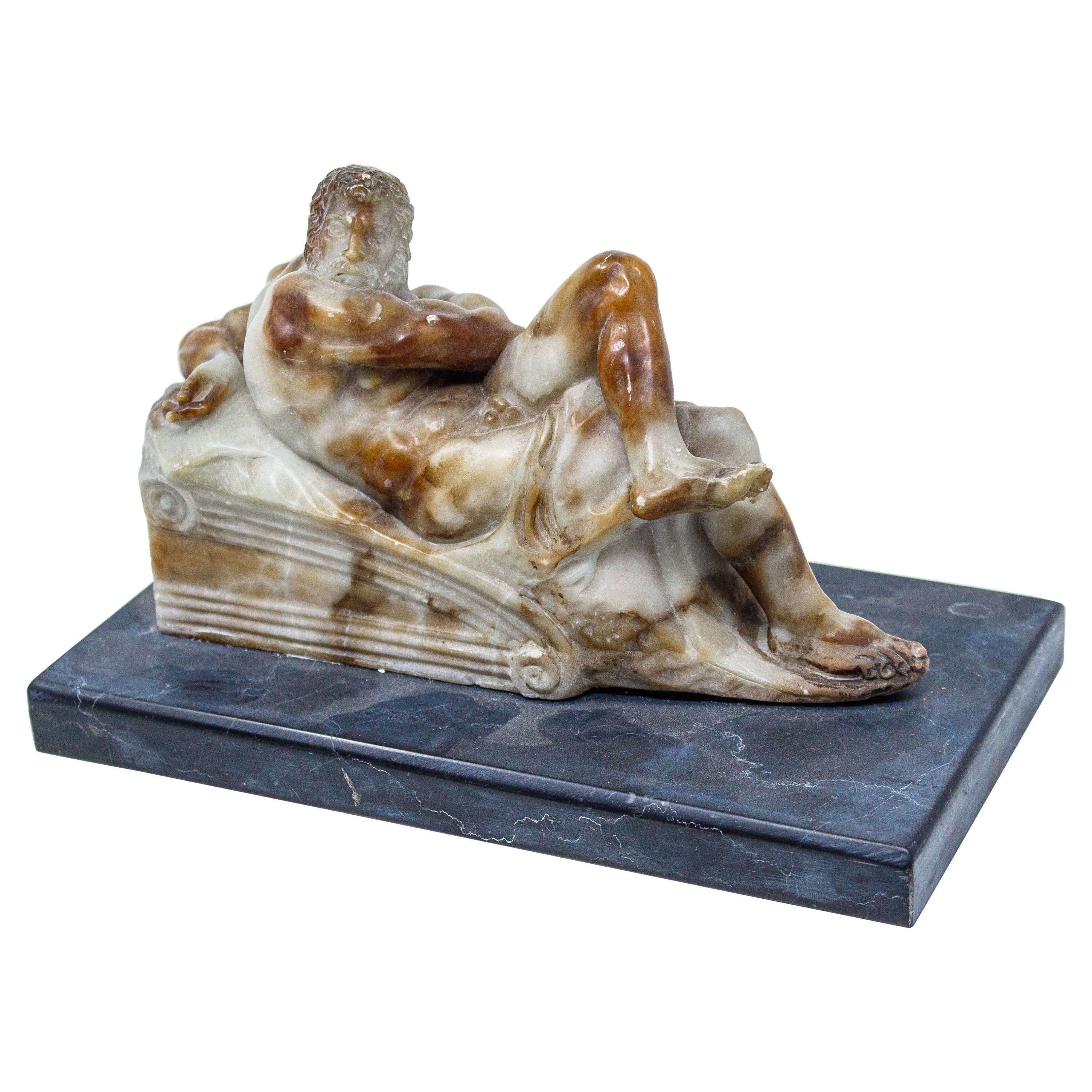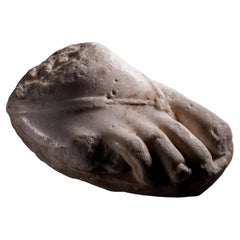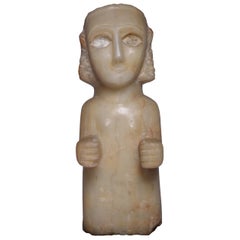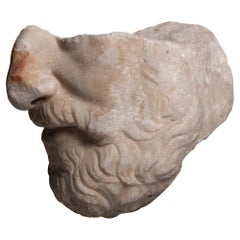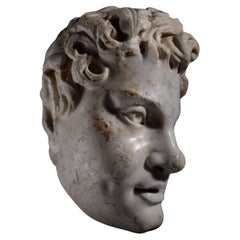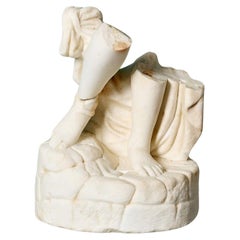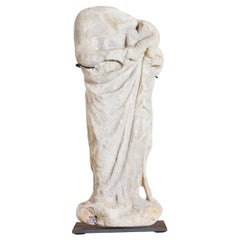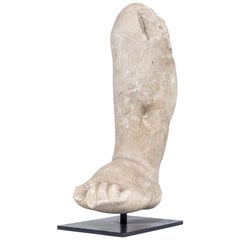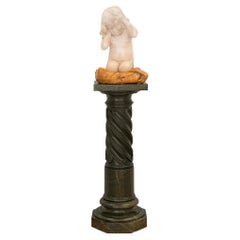Items Similar to Roman Marble Statuette of Jupiter
Video Loading
Want more images or videos?
Request additional images or videos from the seller
1 of 8
Roman Marble Statuette of Jupiter
$33,000
£24,977.47
€28,761.16
CA$46,945.94
A$50,854.07
CHF 26,776.73
MX$617,263.31
NOK 333,939.51
SEK 315,731.98
DKK 214,710.37
About the Item
Roman Marble Fragment of jupiter
Circa 2nd-3rd Century A.D.
Measure: Height: 19.7 cm
This beautiful Roman fragmentary statuette depicts Jupiter, the king of the gods, here recognisable from his two chief attributes, the eagle with outstretched wings - according the Pseudo-Hyginus, singled out by Jupiter because ''it alone, men say, strives to fly straight into the rays of the rising sun'' - and the base of the scepter, which remains at the side of the left foot, an aspect likely borrowed from the statue of Zeus at Olympia, once one of the Seven Wonders of the World. Though much of the original piece has been lost, the subtle anatomical detail in the feet mark this out as a piece of exceptional quality, and the work of an artist of particular talent and patience - as Johann Winckelmann once said of the famous Belvedere Torso, ''if you contemplate this with a quiet eye [...] the god will at once become visible in this stone.''
This fragment once caught the eye of Henry Howard, 4th Earl of Carlisle (1694-1758), a Knight of the Garter and among the most prolific collectors of his day. The piece, acquired during his travels to Rome, was proudly displayed on an alcove of the Western Staircase of Castle Howard, North Yorkshire, the seat of the Howard family and home to one of the largest and most illustrious collections of antiquities ever assembled in Britain.
Provenance:
Acquired by Henry Howard, 4th Earl of Carlisle, between 1714-1739, during his travels to Rome, and thence by descent
Subsequently Sothebyís, Castle Howard sale, 11 November 1991, lot 44
Published:
B. Borg & H. von Hesberg, A. Linfert, Die antiken Skulpturen in Castle Howard, MAR XXI, Wiesbaden, 2005, 69, Cat. no. 28, Pl. 24
Arachne 3827: Lower part of a statuette of Zeus/Jupiter, Castle Howard, Yorkshire, Western Staircase.
- Dimensions:Height: 7.76 in (19.69 cm)Width: 6.26 in (15.88 cm)Depth: 3.16 in (8.01 cm)
- Style:Classical Roman (Of the Period)
- Materials and Techniques:
- Place of Origin:
- Period:
- Date of Manufacture:circa 2nd-3rd Century A.D.
- Condition:
- Seller Location:London, GB
- Reference Number:Seller: 422941stDibs: LU1052232432702
About the Seller
5.0
Recognized Seller
These prestigious sellers are industry leaders and represent the highest echelon for item quality and design.
Gold Seller
Premium sellers maintaining a 4.3+ rating and 24-hour response times
Established in 2007
1stDibs seller since 2014
103 sales on 1stDibs
Typical response time: 7 hours
Associations
LAPADA - The Association of Arts & Antiques DealersInternational Confederation of Art and Antique Dealers' AssociationsThe British Antique Dealers' Association
- ShippingRetrieving quote...Shipping from: London, United Kingdom
- Return Policy
Authenticity Guarantee
In the unlikely event there’s an issue with an item’s authenticity, contact us within 1 year for a full refund. DetailsMoney-Back Guarantee
If your item is not as described, is damaged in transit, or does not arrive, contact us within 7 days for a full refund. Details24-Hour Cancellation
You have a 24-hour grace period in which to reconsider your purchase, with no questions asked.Vetted Professional Sellers
Our world-class sellers must adhere to strict standards for service and quality, maintaining the integrity of our listings.Price-Match Guarantee
If you find that a seller listed the same item for a lower price elsewhere, we’ll match it.Trusted Global Delivery
Our best-in-class carrier network provides specialized shipping options worldwide, including custom delivery.More From This Seller
View AllRoman Marble Foot
Located in London, GB
Roman marble Fragment of a Right Foot with Sandal
Circa 1st - 2nd Century A.D.
An evocative Roman marble fragment, preserving the front portion of an over-lifesized sandalled foot. The toes, nails, and bridge of the foot have been sensitively carved. The outer sole of the sandal remains, with delicate, pointed straps joining between the first two toes in a diamond shape.
This fragment once belonged to Danish sculptor Jens Adolf Jerichau...
Category
Antique 15th Century and Earlier Italian Classical Roman Figurative Scul...
Materials
Marble
Ancient South Arabian Alabaster Statue
Located in London, GB
South Arabian Calcite female figure
3rd Century BC to 1st century A.D.
Calcite Alabaster
height: 30.5 cm
A magnificent alabaster female figure, a f...
Category
Antique 15th Century and Earlier Yemeni Figurative Sculptures
Materials
Alabaster
Roman Marble Head Fragment
Located in London, GB
This fine Roman marble head fragment, with broad nose, soft lips, and bearded chin, captures the likeness of one of the most important playwrights of...
Category
Antique 15th Century and Earlier Italian Classical Roman Busts
Materials
Marble
Roman Marble Head of a Satyr
Located in London, GB
Head of a Satyr
Roman, circa 2nd - 3rd century AD
Carved and highly polished marble
An extremely fine marble head of a satyr, depicted with ivy wreath, curly hair and pointed goat’s ear, the full lips slightly parted to reveal the creature’s clenched teeth.
The head was once part of a relief with visible fragmentation on the left side. Almost completely worked in the round and carefully polished, the skill of the sculptor is particularly remarkable given the confined working space available for a relief carving, such as this.
The Roman Imperial Period marked the expansion of the political and cultural influence of the Roman Empire. The period began with the reign of Augustus in 27 BC, immediately following Caesar’s assassination which ultimately ended Rome’s time as a republic. Soon after, Augustus’ defeat of Anthony and...
Category
Antique 15th Century and Earlier Busts
Materials
Marble
Etruscan Bronze Statuette of Discus Thrower
Located in London, GB
A remarkably fine example of Archaic sculpture. A figure of a discophoros, or discus bearer, standing with his right leg forward, gripping a discus in his right hand, the left arm raised with an open palm. Described with admiration in Münzen und Medaillen's 1961 auction, "The figure is a masterpiece and illustrates with rare vividness the essence of good Etruscan sculpture...
Category
Antique 15th Century and Earlier Figurative Sculptures
Materials
Bronze
Natural Gogotte Formation
Located in London, GB
A magnificent example of a gogotte formation composed of thick swirls and folds of sparkling sandstone. Discovered in the Oligocene sand dunes of Fontainebleau, France, formed circa 30 million years before present or later.
The incredible, almost otherworldly appearance of gogottes may easily be mistaken for the work of a most talented artist. In fact, these sandstone sculptures are entirely natural in origin. They have been found in multiple locations but those from Fontainebleau, such as the present example, are the most remarkable. Thirty-five million years ago, a sea covered what is now the forest of Fontainebleau, and dunes of exceptionally fine and homogenous sand formed. As silica-rich water filtered through this sand, it turned into stone. The flow of water finely modelled the sandstone into the aesthetic concretions we now know as gogottes. These are rare and are only found sporadically several metres deep into the ground. They owe their sparkling white appearance to the extreme and unmatched purity of the Fontainebleau sand, sometimes reaching a composition of 99.9% silica. Each of them is unique – a masterpiece slowly fashioned by the hands of Nature.
The intriguing name of “gogotte” was coined by French geologist Claude Guillemin (1923- 1994), who was inspired by the children’s book series Babar the Elephant. In one of the books, a group of monsters called Gogottes are shown hiding behind rocks. These rocks reminded Guillemin of the sandstone concretions...
Category
Antique 15th Century and Earlier Natural Specimens
Materials
Other
You May Also Like
Antique Fragmentary Statuary Marble Sculpture
Located in Wormelow, Herefordshire
An antique fragment of a statuary marble sculpture, sourced from the estate of the late David Cornwell, best known as the author John le Carré.
Dating to circa 1840, this striking I...
Category
Antique Mid-19th Century Italian Neoclassical Figurative Sculptures
Materials
Marble, Statuary Marble
Ancient Roman Marble Sculpture
Located in Round Top, TX
Ancient Roman marble sculpture. Includes custom iron stand. This is the real thing!
Category
Antique 15th Century and Earlier Italian Figurative Sculptures
Materials
Marble, Iron
Renaissance Era, Marble Fragment of a Leg
Located in Los Angeles, CA
Chic, 15th Century, Roman marble fragment of a left foot and calf mounted on a custom iron stand.
Category
Antique 15th Century and Earlier Italian Renaissance Figurative Sculptures
Materials
Carrara Marble
Italian 19th Century Marble Statue on Its Original Pedestal
Located in West Palm Beach, FL
A stunning museum quality Italian 19th century white Carrara, Sienna and Vert de Patricia marble statue on its original pedestal. The pedestal i...
Category
Antique 19th Century Italian Figurative Sculptures
Materials
Marble
Italian 19th Century White Carrara Marble Statue of a Young Girl
Located in West Palm Beach, FL
An exceptional and decorative and handsome 19th century Italian white Carrara marble statue. This spectacular marble fragment of a leg and feet, likely a classical figure donning a f...
Category
Antique 19th Century Italian Figurative Sculptures
Materials
Carrara Marble
18th Century Personification of the Day Alabaster Sculpture
By Michelangelo Buonarroti
Located in Milan, IT
18th century
Personification of the Day
Alabaster, cm 11.5 x 17.5 x 5
With base cm 14.5 x 20,8 x 11.7
Il Giorno is a marble sculpture (160x150 cm) that Michelangelo mad...
Category
Antique 18th Century Figurative Sculptures
Materials
Alabaster
More Ways To Browse
Marble Fragment
Roman Fragment
Antique Fragment Marble
Jupiter Sculpture
Roman Marble Fragment
Castle Howard
Zeus Statue
Carved Figure Germany
Golf Sculpture
Grand Tour Greek
Hercules And The Nemean Lion
Male Torso Sculpture
Pompeii Furniture
Porcelain Figural Group
Porcelain Figure Groups
Sculpture Guitar
Sculptures Woman And Man
Woman Glass Sculpture
